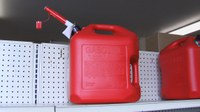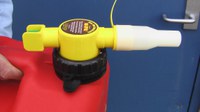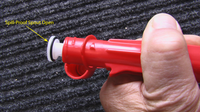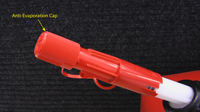New Regulations Imposed on Portable Fuel Containers
(Click an image below to view a high-resolution image that can be downloaded)
Portable fuel containers (gas cans) commonly used by consumers to refuel gasoline-powered equipment, such as lawn mowers, are under new regulations this year. As of Jan. 1, 2009, all portable fuel containers sold in the U.S. are required to conform to two new regulations:
- Mobile Source Air Toxic regulations
- Requirements of the Children’s Gasoline Burn Prevention Act
“These regulations are intended to protect children from accidently accessing stored fuel and to protect the environment from harmful volatile organic compounds,” says John Nowatzki, North Dakota State University agricultural machine systems specialist. “Since the new containers are designed to reduce evaporation and spills, they also save fuel. The regulations apply only to new fuel containers, so existing containers do not have to be discarded or upgraded.”
The regulation dealing with fuel spills is designed to reduce fuel escaping from the containers by spills or evaporation. Volatile organic compounds (VOC) are released into the atmosphere when gasoline evaporates if the cap is left off the container and can permeate through the plastic container. VOC are an environmental concern because they are greenhouse gases, can contaminate groundwater and can cause human health problems, such as headaches and nervous disorders.
Although a portable gas can is a relatively modest emission source, the cumulative VOC emissions from the approximately 80 million containers that the Environmental Protection Agency estimates exist in the country are significant.
The new container spouts conform to the new spill-prevention regulation by incorporating an automatic locking device that prevents fuel from being poured from the container unless the lever is depressed.
“This spill-prevention nozzle also makes it more difficult for a child to pour fuel from the container,” Nowatzki says. “The spout also is designed with an airtight seal preventing evaporation or spills when not in use. Plastic containers are made of durable, high-density polyethylene, with barrier materials to virtually eliminate hydrocarbon emissions through the container walls.”
Any portable fuel container manufactured after Jan. 17, 2009, also must be certified as childproof. The new containers must conform to the child-resistance standard as specified in the Children’s Gasoline Burn Prevention Act. The American Society for Testing and Materials International has established a standard for child-resistance requirements for closures on portable gasoline containers.
“The container closures on the fuel containers are similar to child-resistance caps on medicine containers,” Nowatzki says. “The containers incorporate a tab that must be squeezed toward the lid while unscrewing it in order to remove it from the container. The required spill-prevention nozzle also is a childproof feature.”
NDSU Agriculture Communication
| Source: | John Nowatzki, (701) 231-8213, john.nowatzki@ndsu.edu |
|---|---|
| Editor: | Rich Mattern, (701) 231-6136, richard.mattern@ndsu.edu |





